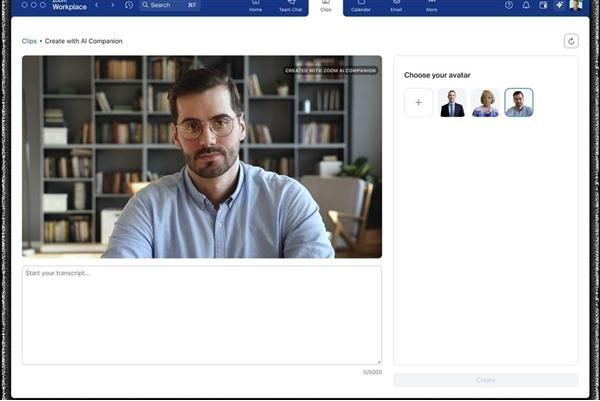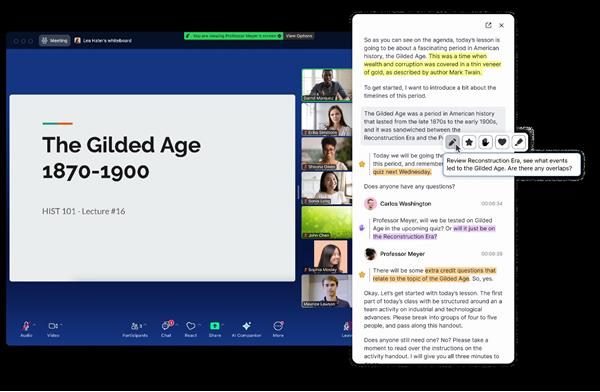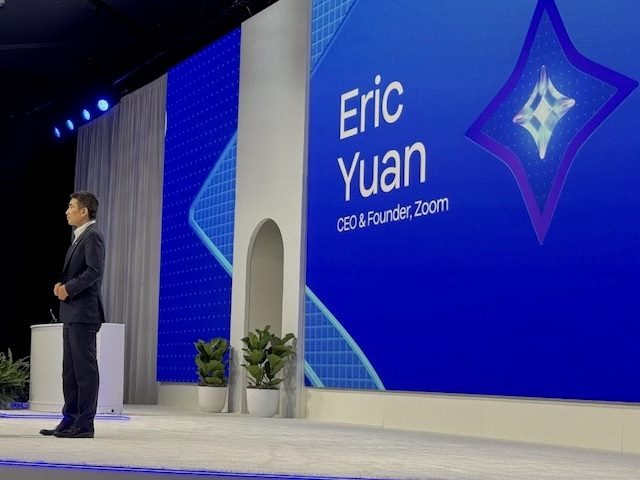On October 9th, 2024, Zoom hosted Zoomtopia 2024, a hybrid event accessible to a global audience, to unveil its latest advancements aimed at transforming the hybrid workplace through artificial intelligence. As Zoom continues to expand beyond traditional video conferencing, this year’s event focused on AI-powered productivity tools, personalized user experiences and solutions tailored for specific industries like healthcare, education and customer service. The announcements reflect Zoom’s goal to become an indispensable platform for the future of work.
Below, I’ve clustered a few announcements into themes and shared my take on each.
Zoom’s Expanded AI Capabilities with AI Companion 2.0
The Zoomtopia keynote introduced AI Companion 2.0, a comprehensive AI enhancement now embedded across Zoom’s core platform, including meetings, chat and phone applications. This new iteration of the AI Companion offers real-time insights, automatically generated meeting summaries and task automation, all designed to streamline the workflow of hybrid teams. With these features, Zoom provides a toolkit to minimize repetitive tasks and maximize productivity, whether employees are in the office or working remotely.
Zoom’s AI Companion 2.0 also integrates real-time contextual assistance, allowing users to remain focused on high-value tasks by handling routine aspects like note-taking and follow-ups. In hybrid environments, where quick shifts between devices and locations are common, these capabilities ensure a seamless user experience that supports fluid collaboration. By embedding AI directly at the edge, Zoom ensures that its solutions can adapt to the unique needs of users in real-time, improving the overall effectiveness of remote and in-person interactions.
The AI Companion’s productivity enhancements underscore Zoom’s strategy to position itself as a multifaceted workplace platform. In a hybrid work setting, where adaptability and efficiency are paramount, Zoom’s AI-driven features provide flexibility that caters to a variety of organizational demands, making it a critical tool for enterprises aiming to optimize their workflows.
Related Article: Zoom Workflow Automation Underlines Its Enterprise Collaboration Shift
Zoom Introduces Personalized AI Experiences With Custom AI Companion
Zoom also showcased its Custom AI Companion, which allows organizations to tailor AI tools specifically to their operational needs. With this feature, businesses can customize AI skills and integrate the AI Companion with enterprise software like Workday, ServiceNow and JIRA, which facilitates deeper automation and supports the optimization of unique workflows. This customization capability goes beyond the basic AI functions, giving organizations more control over how AI impacts their daily processes.
One of the more unexpected enhancements announced during the keynote was the introduction of personalized avatars, which enable users to create virtual representations of themselves for meetings. We are no longer talking about cute cartoon rabbits. Rather, with a video and audio sample, Zoom can generate a realistic avatar that mimics facial expressions and gestures, offering a more interactive experience for participants. So now, when you find yourself in a video call but unable to turn on your camera, Zoom believes these new avatars can help foster a sense of connection through more realistic, albeit AI-generated, facial expressions, eye contact and head gestures.

Industry-Specific Solutions for Education, Healthcare and CX
Zoomtopia 2024 also revealed Zoom’s dedication to industry-specific AI solutions. Zoom has tailored its platform to serve sectors with unique needs, such as healthcare, education and customer service. In healthcare, Zoom’s AI tools can automate tasks like clinical note-taking, freeing clinicians to focus more on patient interactions. This automation represents a significant improvement for healthcare providers who typically spend a considerable amount of time on documentation.
In customer service, Zoom’s AI technology enhances the quality and speed of interactions. For example, AI can analyze customer inquiries in real-time, suggest responses and even resolve basic issues autonomously. This reduces wait times and improves customer satisfaction while allowing human agents to address more complex issues that require personal attention. By automating routine tasks, Zoom not only improves operational efficiency but also creates a more streamlined experience for both customers and service representatives.
For the education sector, Zoom’s AI features like automated transcription and language translation support educators in reaching diverse, multilingual audiences. By understanding the specific challenges faced by each industry, Zoom provides tools that directly address the operational needs of healthcare providers, educators and customer service agents, positioning itself as a valuable partner in driving productivity and engagement across different professional environments.

Related Article: Zoom Workplace Has Its Work Cut Out for It
Security and Responsible AI
The emphasis on security and responsible AI was a key theme during the event, reflecting Zoom’s awareness of the ethical considerations that accompany AI’s expanding role. Zoom introduced informed consent mechanisms for AI applications used in in-person settings, ensuring users are fully aware when AI features are active. This focus on transparency aligns with industry best practices and underscores Zoom’s on going commitment to ethical AI deployment in a hybrid work environment — a recurring theme for Zoom following an early misstep with data privacy which it quickly remedied.
Zoom also implemented avatar authentication protocols to prevent unauthorized use of digital personas. By verifying user identities before avatars are activated in meetings, Zoom addresses potential security risks associated with virtual identities, particularly in industries where privacy and confidentiality are paramount.
It was good to see Zoom’s thoughtful approach to AI security, which reinforced its dedication to creating a safe and trustworthy environment for AI adoption. As digital collaboration continues to grow, these responsible AI practices ensure that Zoom can support organizations in deploying AI solutions that prioritize user control and data integrity.
Looking Ahead: Opportunities and Competitive Challenges for Zoom’s AI Strategy
The innovations announced at Zoomtopia 2024 underscore Zoom’s commitment to driving workplace transformation with AI. However, Zoom’s expansion into industry-specific solutions introduces new competitive dynamics. In healthcare, Oracle is a notable player, leveraging AI for clinical workflows and electronic health records. Zoom’s healthcare solutions will need to differentiate themselves to compete effectively in this space.
In education, Zoom will encounter competition from platforms like Course Hero, which specializes in AI-driven academic support for students and educators. Course Hero’s robust content library and personalized assistance appeal to teachers and administrators looking for targeted educational tools, highlighting the increasingly specialized demands in the education sector.
In frontline workforce solutions, Salesforce remains a strong competitor, particularly with its Salesforce Field Service offering, which provides AI-driven support for field operations. As Zoom ventures into solutions for frontline workers, it will need to contend with Salesforce’s established position and targeted AI capabilities.
In addition to these competitive challenges, Zoom’s continued focus on security and ethical AI will be crucial as it scales. With features like informed consent and avatar authentication, Zoom demonstrates an awareness of privacy concerns, aiming to build trust as AI becomes more integrated into workplace tools. Despite these challenges, Zoom’s strategic investments in AI-driven productivity and industry customization provide a strong foundation.
If executed well, Zoom’s approach has the potential to make it a leading platform for hybrid work. Zoom’s strategy of “AI for free” in its core communication suite and only monetizing specific vertical solutions is a refreshing alternative to Microsoft’s or Google’s approach of licensing AI at every step of the journey. With this increased access to AI tools, the outcome could be a lot of Zoom customers turning to Zoom AI companion for commonplace AI tasks like note-taking, document summarization, or even “prep me for my day.” This could lead to more productivity work taking place in the Zoom client.
Or, as Zoom’s CEO Eric Yuan would say, there is potential for many people to “Work Happy” with Zoom AI Companion.
Learn how you can join our contributor community.
